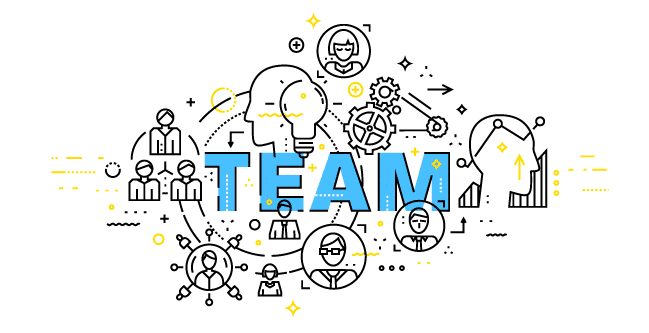Evolving B2B Industrial Sales with a Winning Strategy
Buyer Focused, Problem Based, Industrial Marketing Supported
Industrial sales used to be straightforward.
 Either B2B industrial marketing created a "lead" through tradeshows or print ads in magazines, or salespeople uncovered (or created) a project through referrals and prospecting....back when a salesperson could reach a buyer by phone or in person.
Either B2B industrial marketing created a "lead" through tradeshows or print ads in magazines, or salespeople uncovered (or created) a project through referrals and prospecting....back when a salesperson could reach a buyer by phone or in person.
There used to be decision-makers (individuals vs. today's buying teams & committees) and companies weren't as carefully scrutinized by investors, stakeholders, and regulators.
And, of course, buyers used to rely on salespeople as the gateway to information that couldn't be obtained elsewhere.
That's changed. Information is ubiquitous. Buyers lack time to keep up with their workload, much less undertake anything new. Teams with competing agendas and priorities struggle to make consensus decisions. And it's difficult to reach buyers.
Contemporary industrial sales shares little in common besides the name. To succeed today, manufacturing companies need to take lessons from high-performance investor-driven companies to build a revenue growth engine that's as deliberately engineered as their products.

"Discovery" at Your Own Peril
Industrial sales processes are still largely built on a discovery process.
Salespeople are trained to expect buyers to agree to squander a precious hour of time on a meeting which will be consumed with some combination of product/service feature regurgitation (euphemistically called a 'presentation') and a number of inane questions designed to provide the salesperson they ammunition they need to sell.
That doesn't work. Nobody with any authority or big picture perspective will entertain that sort of meeting. And those who persist in trying will find fewer and fewer receptive victims.
Instead, companies that really understand the problems they solve for buyers, and therefore the right ideal customer profile (ICP) will identify the companies to which they should likely be selling. Then, just as buyers research vendors, they'll use the endless resource of the internet to research buyers, including strategy, trends, markets, customers, leadership, priorities, competitors, etc.
That information for both the company and the key buyer roles on a typical buying team (Challenger, Inc. research indicates an average of 10.2!) - combined with an understanding of the industry best practices and challenges, allows a competent salesperson to approach prospects with informative, valuable insights.
That's the price of entry - the ability to instantly demonstrate the likely ability to contribute value in a conversation. There is no shortcut. Time-consuming research is the only way to differentiate your outbound sales to improve your rate of connects, conversations, and meetings.
Therefore, industrial marketing plays a growing role in industrial sales, because the research into industrial buyers means that not only sales, but industrial marketing begins with steps long before sales gets involved.

1:1000
How many emails does your prospect receive every day? Whether it's 100 or 1,000 (and my guess is that their personal assistant is working through a number closer to 1,000) yours is one tiny data point in a mass of urgent issues, pressing priorities, and extraneous crap.
The only way to get opened, read and considered is to speak directly to them - the person, the human, and the executive. That means from a person on your end - to the person and what's important to them on their end - ideally using tools that convey that connection (e.g. sales video.)
Here's the paradox of technology. The very tools that allow your sales team to do outreach to industrial buyers on a mass scale also make them easier to discern, likely to be ignored and less effective.
You have to think old-school, person to person, enhanced with technology.
Further, your B2B marketing and personalized communications must focus exclusively on the buyers interests, likely problems, agenda and timeline. The old "sales process" is an anachronism today. Your processes, technology, messaging - even your products & services, roadmap and messaging must be buyer focused in aggregate, and personalized in each interaction.

Manufacturing Marketing Is Industrial Sales
Think about your buying experiences. You move, at your pace, according to your priorities, through ideation, speculation, research, sales inquiries, back to research, off to other priorities, and maybe back to a buying decision.
Your buyers are the same.
That means that the traditional corporate bifurcation of functions - between a small marketing department and a large sales department - is now ill-suited for buyers.
Instead, you need to match the buyers' expectations with a revenue growth function that combines manufacturing marketing with industrial sales. Certainly, you'll have different skillsets and KPIs for different disciplines, but an integrated focus is critical to delivering experiences that match buyer expectations.
And that means some disruptive reallocation of resources, including budget and headcount.

Why Do Industrial Manufacturers Treat Sales Like a Mystical Black Box?
You don't just randomly weld a few frame members together, slap a PLC on them and attach a few pistons, valves and motors. Your machinery is carefully engineered. Generations of innovation build upon each other, and lessons learned are incorporated into innovative design iterations.
Your industrial sales team, in contrast, probably follows the same approaches to revenue growth that they always have - plus now you have a website and they have email.
It's time to engineer the revenue growth process as rigorously and iteratively as you have your technology. That means:
- Techstack - CRM, marketing automation, CDP, video, chat, data unification, etc.
- Datastack - first, second and third party intent data, enrichment data, etc.
- Sales Functions - sales operations, business development reps, channel managers, account executives, inside sales, and field sales
- Marketing Functions - product marketing, demand generation, competitive marketing, content creation and placement/promotion, inbound marketing, technical SEO, marketing operations, ad management, technology optimization, social media, event management, and website optimization
- In and Outbound - strong, optimized, content-based inbound marketing and target account sales (account-based marketing) driven outbound sales
- Talent - your trade show coordinator and loyal sales team from Y2K might not be the right folks to execute (research, technology, buyer focus, etc.)
- Resources - not only will this effort require reallocation of budget dollars, but also executive time spent managing the change and emphasizing the importance
All of these, whether under the label of marketing or sales, are important components of a well-engineered industrial sales engine.
Industrial Sales Modernization May Be The Hardest Transformation Project You'll Undertake
This isn't about a tweak - it's a wrenching cultural change
Sure, you can try to tweak here and there, implement a tactic or two, but that's like switching the brand of a prox switch on your machine. It doesn't change the function.
Upgrading industrial sales impacts everything from revenue, forecasting and pipeline management, through the way you discuss customers, prospects and the market internally. Your marketing strategy and industrial marketing team are critical elements of your industrial sales success.

Business Issues
Nobody cares what you sell - product or service.
Get over it.
They care how you improve their business and their daily activity

Data
An engineered revenue growth machine runs on data.
You'll need to capture it, supplement it and maintain it.

Top Talent
A superstar controls engineer or programmer is what you build your products on.
You need sales people and marketing talent of the same caliber.

Process, Tactics & Strategy
There is no single solution.
Advanced buyer behaviors and expectations require advanced, integrated, revenue growth approaches.

Technology
Post-it notes and spreadsheets aren't enough.
Success will require investment and adoption of CRM, marketing automation and related tools.

The Role of Sales
Let's face it.
Industrial sales teams don't like to be held accountable. They are accustomed to being left to do their own thing - their way.
In the past, perhaps, that was OK. Today, though, there's a better way. And many sales teams miss quota. Consistently.
So whether they like it or not, it's time to do the right thing for the business and build a revenue growth structure around the manufacturing marketing and industrial sales best practices that work today.
Great salespeople will embrace the opportunity. Average salespeople will self-select out.
Frequently Asked Questions
Can I keep my sales team?
Sure.
And hopefully, they'll bring the energy, accountability, creativity, and willingness to adopt new technology and techniques.
But the bottom line is the vitality of the business, not the delight of your veteran sales team. And you should be prepared for the fact that some will resist.
I've tried CRM and it failed. Will it work now?
Will you hold your salespeople accountable?
Will you invest in technology that's easy for them to use, makes them more effective and supports the customer experience first?
In other words, if you solve for buyers, and empower your sales team, the technology will work and top sales talent will embrace it.
But it's got to be built for them, and you've got to hold them accountable.
Are you a sales trainer?
No.
While sales training is important, it must be built on a strategy, along with systems, technology, and process.
I help industrial manufacturers with those pieces, and once the foundation is in place, and you have the right sales team, then maybe you'll want to find a sales trainer.
What kinds of manufacturing companies do you work with?
The best answer is I work with B2B companies with complex sales processes. That includes professional services and products.
I have particular expertise in the industrial manufacturing space, particularly with capital equipment.
How Does Industrial Sales Fit Into Strategy?
Transforming Industrial Sales With Strategic Blueprint for Superior Performance
As the industrial sales landscape continues to evolve, it becomes increasingly evident that a strategic direction shift is beneficial and essential for companies seeking to maintain a competitive advantage. This transformation requires a thorough reevaluation of the company's activities and a move towards a more integrated approach to business strategy and corporate strategy.
Embracing a Competitive Strategy for Long-Term Success
The heart of this transformation lies in the development of a competitive strategy that leverages the unique strengths of the business unit. This involves identifying and capitalizing on competitve advantages that set the company apart in the market. Operational effectiveness, while crucial, is no longer the sole determinant of success. To truly excel, companies must perform activities differently, carving out a valuable position in a landscape often characterized by zero-sum competition.
Strategy Development: Beyond the Status Quo
Strategy development in this context goes beyond maintaining the status quo. It's about understanding the myriad different ways in which a company can deliver superior performance. This requires many managers to think outside the box, challenging conventional wisdom and exploring new avenues for growth and innovation.
The Role of Business Units in Strategic Direction
Each business unit within a company plays a pivotal role in this journey. They are the building blocks of a robust corporate strategy, each contributing in different ways to the overall competitive strategy. By aligning the goals and operations of these units with the larger strategic direction, companies can create a cohesive force that drives forward towards common objectives.
Operational Effectiveness and Competitive Advantage
Operational effectiveness is a significant part of gaining and maintaining a competitive advantage. However, it's crucial to recognize that this alone is not enough. In today's dynamic market, companies must also strive to perform activities differently, offering something unique that cannot be easily replicated by competitors.
Valuable Position: The Key to Avoiding Zero Sum Competition
Avoiding zero-sum competition is about finding and maintaining a valuable position in the market that competitors have not exploited. This involves a deep understanding of the market, the competitors, and the company's own strengths and weaknesses. A valuable position is one that delivers real value to customers in a way that others cannot.
Superior Performance: The End Goal
The end goal of all these efforts is superior performance. This doesn't just mean better financial results, but also a stronger brand, greater customer loyalty, and a more significant market share. Achieving this requires a long-term commitment to not just doing things better, but doing better things.
Challenging the Company's Activities for Growth
For real growth and transformation, it's essential to challenge the current company's activities. This means scrutinizing every aspect of the business, from production to sales, and asking whether there is a better, more efficient, or more innovative way to operate.
Moving Beyond the Status Quo
Moving beyond the status quo is essential for companies looking to make a real impact in their industry. This requires not just an acceptance of change but an eagerness to embrace it. Companies that cling to outdated methods and ideologies will find themselves left behind in an ever-evolving market.
The Role of Managers in Driving Change
Many managers play a critical role in driving this change. They are the ones on the ground, implementing strategies, and inspiring their teams to strive for more. Their ability to see and enact change is crucial for the successful transformation of the company.
Different Ways to Achieve Success
Finally, it's essential to recognize that there are different ways to achieve success. There is no one-size-fits-all strategy. Each company must find its path, leveraging its unique strengths and capabilities to carve out a place in the market.
In conclusion, transforming industrial sales in today's competitive environment requires a comprehensive reevaluation of business and corporate strategies. By focusing on creating a unique competitive strategy, aligning business units with strategic direction, and challenging the status quo, companies can position themselves for long-term success and superior performance.
Can I improve industrial sales alone?
In other words, can you isolate the sales piece and hold off on the marketing piece?
Not if you want results.
So much of today's sales happen through marketing channels and is supported by sales enablement (managed by marketing and sales operations) that without an overhaul of marketing and reallocation of resources, you'll see minimal results and churn top sales talent.
My IT team says we don't need marketing automation...do we really?
No problem.
Your choice.
They want to create something homegrown that is inadequate and can't be supported. If you're comfortable with that, fine.
But if you want to deliver the experience buyers expect, then remind IT that you run the business and select from the top systems out there like HubSpot.
Can you help with indirect sales channel?
Indirect sales channel is often an important piece of the industrial sales and revenue growth engine.
Yes, we often incorporate channel sales elements in our work.
Be prepared, though, that just like your direct salespeople, often channel resists making the required changes.
What's the return on making these changes?
There's zero return on just thinking or talking about it.
In order to see the impact on your topline results and bottom-line profit, you have to be willing to embrace the change management, say goodbye to some longtime employees, and press ahead even when you hear whispers that it won't work in your industry or with your buyers.
And in some cases, the return will be maintenance - as buyers change and your competitors who don't keep up simply deteriorate.
But done well, and energetically, these approaches will deliver improved results.

Ed Marsh is more than a coach, he is a trusted advisor. As an owner of a company my internal team often hesitates to give me pushback. I hear yes a lot. Ed didn’t give me some sort of templated sales advice or sugar coat anything. He took the time to understand my business thoroughly and eventually had enough information to tell us flat out that what we were doing in sales was the wrong approach. He then began walking us though a sales journey and refined our process. We began approaching sales in a way we had never thought of and revenue grew rapidly. Within a year we landed our first national account and Inc. Magazine ranked us as one of the Top 5000 fastest growing businesses in the country. Ed continues to have a tremendous impact on our revenue, but more importantly, our business as a whole.
- Kyle, Co-Founder & Partner





